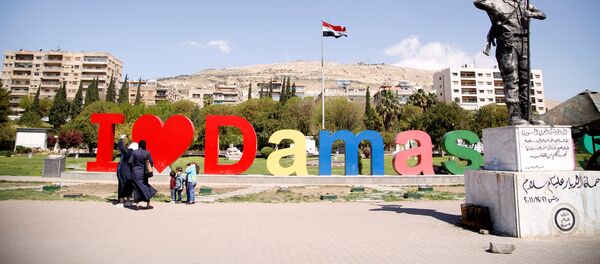In addition to costing hundreds of thousands of lives, and triggering an unprecedented exodus of refugees, Syria's war has had profound implications on the country's political landscape.
Founded in 1932 in Lebanon, the Syrian Socialist Nationalist Party (SSNP) has enjoyed varying levels of support throughout its 85-year history, with supporters appreciating the party's unwavering anti-Zionism and anti-colonialism stances, while critics have dismissed the party's objective of establishing Greater Syria – which includes parts of Egypt, Turkey, and Lebanon – as ludicrous and farfetched.
READ MORE: Syrian Politician Believes Reconciliation Committees Could Be Useful
The SSNP's military wing entered the conflict in its early years, deploying 6,000-8,000 Syrian and Lebanese volunteers to various fronts, publicly siding with the Syrian Army.
“For us, when you have protesters coming out of mosques instead of universities, it is not a genuine revolution. We think the war in Syria is not a struggle between the government and the opposition, but rather a war on Syria itself to divide the country and taking it back to the Dark Ages," Hassan Sakr, head of the SSNP's foreign affairs division, told Foreign Policy magazine, justifying their military involvement in the conflict.
Now, largely as a result of its role in the Syria conflict, support for the SSNP is on the rise, particularly amongst religious and ethnic minorities, who value the party's secularity and active role in defending minorities throughout the multi-year war.
Although the SSNP's military wing will undoubtedly be forced to disband post-war, or alternatively, be incorporated into the country's official armed forces in some form, the future of the wider party is significantly more difficult to forecast.
As the party is allowed to operate in Syria unimpaired, and possesses some political clout – with a small presence in Syria's cabinet and parliament, and over 100,000 members – it's best-positioned to politically challenge the ruling Baath party over the coming years.
Now that the SSNP has gained a foothold in Syrian politics, it is poised to continue to cement its position as Syria's second-largest party. However, to mount a serious political challenge to the popular Baath party, the SSNP needs to further differentiate itself from its ruling rival.
Competing with them will be no easy task, as the SSNP is relatively under-resourced and may struggle to draw Syrians away from the Baath party, which may be considered the best option for the country, at least in the short-term, to provide an element of stability and continuity through Syria's crucial post-war period of reconciliation and reconstruction.
The views expressed in this article are solely those of the author and do not necessarily reflect the official position of Sputnik.


